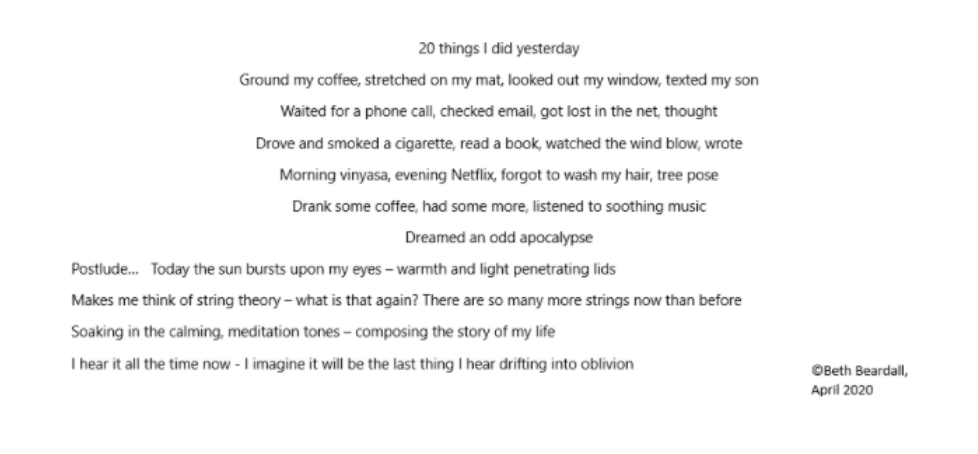In these strange and isolating times, many ESL instructors have navigated a truly steep learning curve of technical knowledge to teach online. Whether your online class looks the way you want it to or not, I applaud your efforts. I bet learners in your class are also very thankful for you!
Some of you might know that April is national poetry month. The theme this year is A World of Poetry. What a great opportunity to create poetry with your online class! Below are some resources and ideas to get you on your way.
First, take a look at these previous TESL ON blog posts about poetry…
Online Resources
For beginner and intermediate levels
- Decoda Resource List: https://www.decoda.ca/read-all-about-lit/poetry-resources-for-listening-reading-and-writing/
- Found on the Decoda Resource List: The List Poem: https://www.nypl.org/blog/2012/04/18/poetry-writing-adult-new-readers-list-poem
For more advanced levels
- Poetry Lesson Plans by Themes: https://poets.org/lesson-plans-theme
- Here is one from this website that could be adapted for online learning: Noticing Poetry: https://poets.org/lesson-plan/noticing-poetry
- On Twitter, Sir Patrick Stewart is sharing a Shakespeare Sonnet everyday during this time of self isolation: https://twitter.com/SirPatStew
How about simply sharing some poems with each other?
- A Poem a Day: https://poets.org/poem-a-day
- April 30th is Poem in Your Pocket Day. This could be changed to poem in your inbox day, or poem in your discussion board day: http://poets.ca/programs/pocketpoem/
Here is a simple exercise to try. Maybe you can make it into a lesson… or just do this for yourself.
Reflections in the moment
- Make a list of 20 things you did yesterday.
- Don’t write your list in chronological order –use a stream of consciousness process – whatever comes to mind.
- Now think of the most precious thing in your life at this very moment.
- Describe it with your senses – taste, touch, smell, hear, feel, see.
Here is my example:

I hope you have fun with poetry. Please share your poems or your poetry lesson ideas in the response section.



2 Comments
I have noticed that, per adult education theory, that noticing can be enhanced by connecting the language learning (and removal of fossilized errors) to the students ‘ particular goals. Students want to perfect their ability to communicate within their desired field or discipline. Outside of that, adequate language to communicate well may be quite sufficient. As always, the teacher has to know the student and facilitate their pursuit of their particular goals. Students ignore information that they don’t perceive as useful.
Thanks David, for your comment about the importance of using noticing as an instructional tool to create awareness of fossilized errors and achieve personal language goals. The foundational principles of andragogy laid out by early theorists Lindeman and Knowles assume that adults’ orientation to learning is life-centred (or task centred) not subject centred.
Another principle of andragogy is the need to know. The instructor should always provide the agenda or objectives of the lesson. I find that as long as I can explain why this lesson about art, music, poetry or literature is beneficial to their language learning and/or personal knowledge base, adult students are open to it. The arts can be incorporated into a program in small doses; it’s a way of taking a break from the everyday.
Artistic expression is deeply tied to a culture and in the program that I teach, many learners have a desire to understand the cultural backdrops of the English language. By sharing the occasional lesson or mini lessons on some aspect of art, learners are taken out of the “one-dimensional thought” of a neo-liberal context of learning and can take some time together in class to consider and reflect upon our shared humanity and challenge the normal everyday way of thinking.